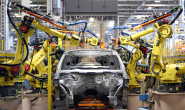Analysis

March 25, 2022
GM, Honda, Toyota Take Downtime on Chip Shortage; Stellantis Retools Jefferson North
Written by David Schollaert
General Motors will pause part of its Chevrolet Silverado and GMC Sierra production for two weeks in April because of the ongoing microchip shortage, a company spokesperson told Steel Market Update (SMU).
The Detroit-based automaker’s Fort Wayne, Ind., assembly plant will take downtime the weeks of April 4 and April 11, the company’s first chip-related production disruption since Nov. 11 of last year.
![]() The carmaker has seen a more stable supply of semiconductors through the first quarter of 2022. But occassional supply disruptions remain a problem .
The carmaker has seen a more stable supply of semiconductors through the first quarter of 2022. But occassional supply disruptions remain a problem .
“Overall, we have seen better consistency in semiconductor supply. … This has translated into improvement in our production and deliveries during the first three months of the year,” the GM spokesperson said. “However, there is still uncertainty and unpredictability in the semiconductor supply base, and we are actively working with our suppliers to mitigate potential issues moving forward.”
Since the onset of the microchip shortage – nearly two years ago – GM has been able to minimize the impact on its highest-demand and capacity-constrained vehicles. This is the first chip-related full-size truck production downtime since last August, the automaker said.
Among other carmakers affected by the lack of chips are Honda and Toyota.
Honda’s North American subsidiary, American Honda Motor Co., started a week-long production outage on March 21 at its assembly plant in Lincoln, Ala., due to a shortage of parts – including microchips, a spokesman told SMU.
“Our Alabama Auto Plant will suspend production for the entire week,” he said. “As this is a fluid situation, we are unable to provide specific facility or model information concerning our other plants.”
The Lincoln facility produces the Honda Passport, Pilot, and TrailSport SUVs as well as the Odyssey minivan and Ridgeline pickup truck.
Toyota North America continued to slog through chip-related challenges at all of its plants, a company spokesperson said. The automaker scaled back its production by an estimated 35,000 vehicles in March, with April reductions also anticipated.
Stellantis, the European parent company of Auburn Hills, Mich.-based Chrysler, said all North American assemblies would be running normal production schedules during the week of March 28, except for its Jefferson North Assembly Plant in Detroit.
The stoppage at Jefferson North is part of a $900 million investment to retool and modernize the plant for continued production of the Dodge Durango SUV and the next-generation Jeep Grand Cherokee, the spokesperson said.
The downtime, scheduled to begin next week, will run for eight weeks. The plant is expected to resume production in late May. Once completed, the upgrades are expected to result in 1,100 new jobs for the region.
Ford, Nissan and Daimler all reported steady production.
By David Schollaert, David@SteelMarketUpdate.com






